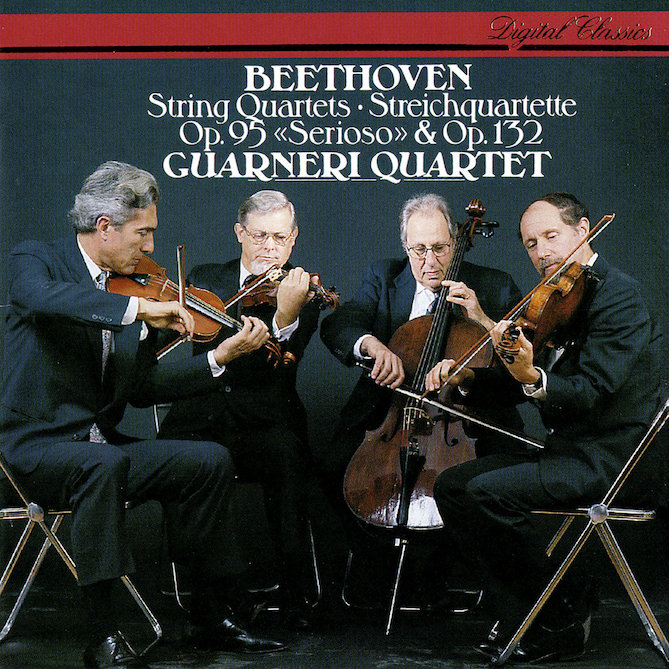
Objects
Arnold Steinhardt
Last summer I was once again a participant in the Marlboro Music Festival. As always, the school generously provided my wife, Dorothea, and me with a house off campus. This time we were given the former home of David Soyer, the cellist of our Guarneri String Quartet for thirty-seven of its forty-five-year existence. Dave passed away in 2010, his wife, Janet, in 2011.
I knew Dave and Janet’s house rather well, a charming, rustic old place set in the woods, and I looked forward to staying in it. When people asked me whether I wouldn’t feel funny living in their house now that they were gone, I laughed and said no at first without really thinking much about it. But then I began to wonder whether Dave and Janet would in fact have liked us to be sleeping in their bed, breakfasting on their porch, or inviting friends over for coffee and cake—friends they might not even know. Dave and I had rehearsed, performed, traveled, eaten, laughed, argued, and partied together literally thousands of times during the Guarneri Quartet’s long career, a career that had begun when we formed the quartet right here at Marlboro. On the one hand, he might have welcomed us with open arms to the house he and Janet clearly loved. Or, in that famously brusque manner of his, he might just as easily have pointed to the door and said, “Out.”
Dorothea and I moved into the house the day before Marlboro began, Walking through the place, I had the odd sensation that the Soyers had merely stepped out for a moment. All their books were still on the shelves. Janet’s paintings still hung on the walls. Three stacks of cello music sat on a desk upstairs as if waiting for Dave to begin working on them. A book titled “Harps and Harpists” lay next to the sofa. Years earlier, Janet had been one of the leading free-lance harpists in New York City, and Dave and Janet had first met at a recording session there.
The couple living across the street who now owned the house had enjoyed a warm relationship with the Soyers. In affectionate memory, they had decided to leave everything more or less intact and to let Marlboro use the house during the summers. Future generations of Marlboro musicians might move into the place still knowing that it was once owned by a distinguished cellist, but it occurred to me that Dave and Janet’s belongings would be nothing more than mute objects to them. They would not know, for example, that the American painter Jack Levine, whose framed poster hung on the living room wall, was a dear friend of the Soyers. Nor would they realize that the many drawings and illustrations of cats scattered throughout the house were there because of Janet’s love of felines, a love that once prompted her to put a vanity license plate on her car saying MEOWWWW.
During my stay at their house, I half-expected Dave to make some kind of appearance, if not as a ghost then at least in my dreams, but that did not happen. Instead, I continued to run into objects that contained rich memories of Dave and our string quartet just waiting to spring to life, each like a genie trapped in a bottle. These memories could surface at any time and in unexpected ways. One morning, Dorothea asked me to get the vanilla extract out of the refrigerator for the pancakes she was making. As I held the bottle in my hand, out popped a memory of a complaint Dave often had during quartet rehearsals about bland playing. Except Dave never used the word “bland.” He would fix the guilty one of us with his stare, make a sour face, and say, “That sounded so vanilla.” And then another memory floated up, of how I would often feign hurt when Dave used the “V” word because, in truth, vanilla is my favorite ice cream flavor. I’d look down at my feet and mutter that I saw nothing vanilla about vanilla. Of course, there was nothing vanilla about Dave’s playing either. With just two or three notes, you already knew from the incisiveness, intelligence, and beauty of his phrasing that they could be coming from no other cellist in the world.
Early in our stay, I discovered another memory-inducing object: a poster hanging on an upstairs wall of the 1965 Spoleto Festival of Two Worlds. Spoleto, Italy, was the initial stop in the Guarneri String Quartet’s very first tour of Europe. The poster prominently featured names of the members of our Quartet, two of our musician wives, and many others who were just beginning to make their way in the musical world. One name conspicuously absent because of her last-minute arrival at the festival was a relatively unknown twenty-year-old British cellist named Jacqueline du Pré. At one of the concerts, she marched on stage, grinning from ear to ear like a schoolgirl, and delivered an enormously affecting performance of one of the Bach Cello Suites. Shortly after, Jackie joined our quartet in a performance of Schubert’s Two-Cello Quintet and I joined Jackie and Thomas Schippers in Mendelssohn’s D Minor Trio.
As I stood before the poster, memories of those noonday performances that were inevitably followed by irresistible Italian food, heavenly espresso, and lively post-concert talk came alive. With those memories, which had not surfaced in decades, a whiff of the excitement I experienced as a young musician drifted across the time barrier, and also a remembrance of my innocence and therefore my lack of anxiety in facing a future that might see our string quartet career end abruptly in only a year or two. (In fact, that career miraculously lasted for almost a half a century.)
Days later, an anthology of humor in the Soyers’ living room caught my eye. As I opened the book, a small folded piece of paper slipped from between the pages and fluttered to the ground. It had been used as an improvised bookmarker but in fact, it turned out to be Dave’s registration receipt from the Grand Hotel Baglioni in Bologna, Italy, room 332, check-out on February 10, 2000. When I dredged up my year 2000 date book later in the season, I discovered that we had played a concert in Bologna on February 7th that year, the final concert of our last European tour with Dave. Dave and Janet must have stayed on to enjoy the city. Two objects, the Spoleto festival poster I had been looking at only days earlier and the Bologna hotel receipt I was now holding, basically bookended Dave’s entire Guarneri Quartet career.
Towards the end of Marlboro, Peter Wiley and his wife, Marcia, came over to the house. Peter, a former student of Dave’s and his successor in our Quartet, suggested that we visit Dave and Janet’s grave just a minute or two away down a crooked little path. Janet had picked out the beautiful stone beneath which their ashes now lay and had arranged for their names and birth and death dates to be chiseled on it. Dave and Janet’s ashes, just like the stone that rested over them, had now joined the world of inanimate objects, and these exercised their special memory-drawing power. Peter, Marcia, and I stood there on that warm, late summer day and were reminded of one Dave story after another.
There were the stories about Dave terrifying pianists who dared to play too loudly, about his love for animals and how he would surreptitiously feed my dog from the table during rehearsal breaks despite our strict orders not to. There were other stories about his tough love that had sometimes made his students cry but ultimately turned most of them into first-rate and grateful cellists. Then there was the story about an occasional student of Dave’s who had played a work for him at one lesson and only managed to have a second lesson on it months later. The student had hardly begun to play when Dave cut him short and demanded to know who had given him such a stupid idea for a phrase. The student, looking embarrassed, answered, “You did, Mr. Soyer, at our last lesson.” Dave glowered at him for a moment. Then his face brightened and he said, “You know what this means, don’t you. You’ve stayed in the same place and I’ve moved on.”
My mother once said rather mournfully after reading the obituary of someone she particularly admired that great men shouldn’t have to die. Whether people great or not, male or female, should have to die is one thing, but it’s sad that every single one of us in all our memorable, endearing, quirky, and exasperating ways is doomed to be forgotten sooner or later. Years from now, anyone who cares to know about Dave as a musician and cellist will be able to get a fairly good idea from the many records he has made, but the objects in David and Janet’s house—the bottle of vanilla, the Spoleto poster, the Bologna receipt, etc.—will have lost the power to tell their stories.
Tacked up on one of the walls of Dave’s house hangs a photo of him under which is printed: “They say I’m David Soyer.”
At least those of us who knew him will be able to look at the photo and affirm that indeed he was, still is, and will always be the remarkable David Soyer.
David Soyer was born on February 24, in 1923. Happy birthday, Dave.
Subjects: Artists
Tags: Arnold, beauty of phrasing, career, cello, cellobello, David Soyer, Guarneri String Quartet, In the Key of Strawberry, incisiveness, intelligence, Italy, Jacqueline du Pré, Marlboro Music Festival, memories, memory-inducing objects, musical world, obituary, Peter Wiley, posters, remembrance, Spoleto, Steinhardt, string quartet, students, teacher
